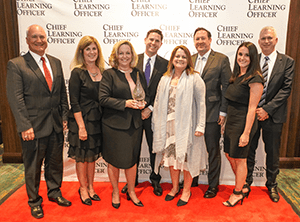Deloitte’s learning strategy aligns with business strategy in its organizational structure, performance management process and formal learning initiatives.
by Lauren Dixon
May 24, 2018

While many learning functions have to prove their alignment and benefit to business strategy, Deloitte’s talent development team purposefully built alignment into the structure of the company and its learning initiatives.
Eight chief learning officers each focus on various segments of the company or the broader learning strategy “to help ensure that there’s alignment in the curriculum to what their specific needs are,” said Nicole Roy-Tobin, managing director of talent development in the strategy and innovation segment of Deloitte.
To determine those needs, each CLO regularly consults with their respective chief talent officer to learn the business goals around client services, market growth, operational performance and talent. These discussions form the basis for defining learning and development priorities, according to the company’s LearningElite application. From there, the CLO determines the learning and development strategies for the year. Additional meetings throughout the year ensure ongoing alignment with business objectives and help adapt to market forces. These efforts align with the goal of the talent development team at Deloitte, which is to drive business performance. Ultimately, the indicator of the team’s impact is employee engagement.
To measure that success, Deloitte professionals receive a talent survey annually, which includes questions about engagement. Additionally, the performance management process involves regularly checking in with individuals about their performance and is another opportunity to measure team engagement. This is also a time for managers to give feedback, clarifying expectations and sharing learning opportunities. Seventy-nine percent of Deloitte professionals said they use this feedback to improve their work. Additionally, 71 percent indicated in 2017 that someone at work has an interest in their growth; this is a six-point improvement compared with 2015.
The talent development team gathers other metrics of success through its Talent Development Impact Dashboard, which provides leadership with quantitative data and qualitative proof points to inform their decisions around learning strategies and share the team’s impact, the application said. A variety of survey data, operational metrics, Deloitte University evaluation scores and occupancy, as well as thought leadership and more, also come into play when expressing effectiveness of the team’s efforts.
Going beyond regular meetings, leadership takes an interest in learning through participation in classroom learning as sponsors, overseeing program design, facilitating, evaluation and more. All of the Deloitte U.S. board and executive committee has been a facilitator or dean of a program, and 92 percent of programs are led by professionals at the company. “By incorporating this ‘leader-led’ learning approach into all aspects of the development lifecycle, senior leaders have become champions of our development culture,” the application said. Leaders at Deloitte also place an importance on developing themselves, Roy-Tobin added.
That development culture occurs through the brick-and-mortar Deloitte University, as well as informal learning experiences through coaching, performance management and a suite of online courses and games, leading to 57.4 average annual learning hours per person in fiscal year 2017.
The most recent effort of the learning function at Deloitte is a revamping of the onboarding process, which sought the insights of the end users: new employees. The Welcome to Deloitte Onboarding Evolution project started with an invitation for volunteers, followed by a selection of a diverse group of 50 relatively new employees, to meet over the course of a weekend to have an “ideathon.”
Teams of these volunteers thought through the timeline of offer acceptance through assignment to a project team, thought of improvements and ultimately created prototypes for their new program. New hires in the Dallas office then tested the ideas and gave feedback, followed by a pitching process to a panel of talent development and business leaders. Five pilots were then created to determine the best new process. Looking through the lens of the end user informed the new onboarding journey, Roy-Tobin said.
“Overall, this process has demonstrated the importance of learner-centric design in defining learning needs from the lens of the learner, as well as the outcomes and objectives they are seeking from a development experience,” the application said.
That learner-centered design will soon come into play when revamping the New Manager Milestone program. The program develops and onboards new managers and is currently a traditional program, Roy-Tobin said. It will soon be a better experience and will improve the confidence of managers at Deloitte.
Ultimately, the talent development initiatives at Deloitte will be continuous and so deeply embedded in the culture that it becomes invisible, she said. “People feel it and experience it, and it feels like it’s just a part of the fabric in the culture, versus something that is delivered by the talent development organization,” Roy-Tobin said.
This mindset, alignment to business strategies and the whole suite of learning strategies are what makes Deloitte learning elite.
Read more about the 2018 LearningElite winners.
Lauren Dixon is a senior editor at Chief Learning Officer. She can be reached at editor@CLOmedia.com.




